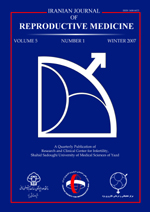
|
International Journal of Reproductive BioMedicine
Research and Clinical Center for Infertility, Shahid Sadoughi University of Medical Sciences of Yazd
ISSN: 1680-6433
EISSN: 1680-6433
Vol. 18, No. 11, 2020, pp. 983-988
|
 Bioline Code: rm20099
Bioline Code: rm20099
Full paper language: English
Document type: Short Communication
Document available free of charge
|
|
|
International Journal of Reproductive BioMedicine, Vol. 18, No. 11, 2020, pp. 983-988
| en |
Quantitative evaluation of human sperm viability using MTT assay: A laboratory study
Momeni, Hamid Reza; Abnosi, Mohammad Hussein & Eskandari, Najmeh
Abstract
Background: 3-(4, 5-dimethylthiazol-2-yl)-2, 5-diphenyl tetrazolium bromide (MTT)
assay which evaluates cellular mitochondrial activity is widely used for the assessment
of cell proliferation and viability.
Objective: This study was performed to assess human sperm viability using MTT assay.
Materials and Methods: In this laboratory study, human-ejaculated semen samples
(n = 56 from different donors) were used. The sperm viability was determined using
quantitative MTT assay and the sperm motility was assessed according to World Health
Organization guidelines. Sperm viability and the correlation between sperm viability
and motility were analyzed.
Results: Data revealed a marked positive correlation between MTT reduction rate
and the percentage of viable spermatozoa. The Pearson’s correlation coefficients also
showed a significant correlation between sperm viability and motility.
Conclusion: MTT assay which is based on mitochondrial functionality is a reliable
method for evaluating human sperm viability and could be used as a diagnostic test
for predicting sperm fertilization ability in clinical settings.
Keywords
Human sperm; Viability; MTT assay.
|
| |
© Copyright 2020 - International Journal of Reproductive BioMedicine
Alternative site location: http://www.ijrm.ir
|
|
